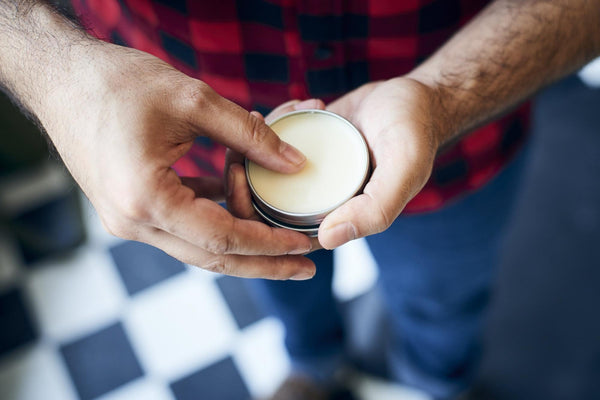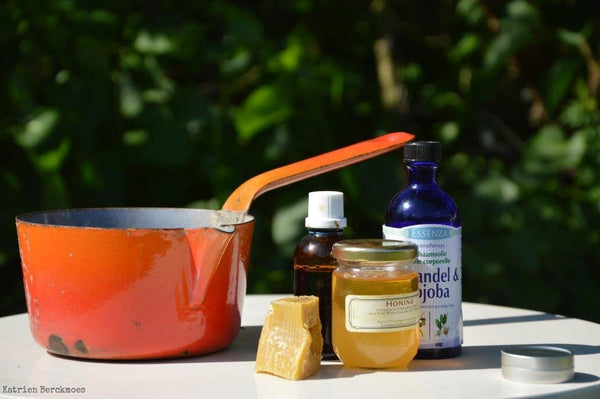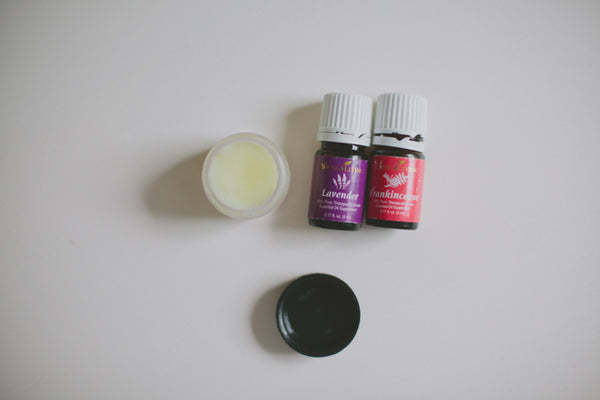Chapped lips are a universal problem—many of us use a balm or stick daily to keep our lips soft and smooth. While chapstick and lip balm may not be something you’d immediately consider when looking for a business opportunity, the growing interest in natural lip care makes this necessity a viable product idea.
Yes, believe it or not, learning how to make lip balm is a marketable skill. Avid DIYers who concoct all sorts of creative projects can take that passion and channel it into a side business. Or, for fledgling entrepreneurs on the prowl for a new business idea, DIY lip balm is a great product around which you can build a business.
It’s easy to take the below recipe and customize it to create your own natural lip balm to market. Because the ingredients are relatively inexpensive and it’s simple to make in your own kitchen, homemade lip balm is a viable way to turn a creative passion into a product.
WANT THE FULL INFOGRAPHIC? This article features an infographic with a basic lip balm recipe. Download the full infographic here.
Why homemade lip balm?
 The natural lip care industry is growing as consumer preferences shift away from highly processed varieties. According to one industry outlook report, in 2015, close to 42% of the women aged 18 years and above said they preferred buying natural beauty products over synthetic beauty products. And the same report shows that the global lip care products market will grow at a steady rate of more than 4% between 2016 and 2020.
The natural lip care industry is growing as consumer preferences shift away from highly processed varieties. According to one industry outlook report, in 2015, close to 42% of the women aged 18 years and above said they preferred buying natural beauty products over synthetic beauty products. And the same report shows that the global lip care products market will grow at a steady rate of more than 4% between 2016 and 2020.
In addition to those statistics, if you peruse interest via Google Trends, you can see that the interest in search terms related to “natural lip balm” has steadily increased over the last two years:
 Natural lip care is also a booming industry in terms of the money spent. According to Statista, various brands enjoyed sales well over $200 million in the U.S. alone. As you can see, the top natural lip balm brand, Burt’s Bees, sold $85.7 million in natural lip care products in 2015:
Natural lip care is also a booming industry in terms of the money spent. According to Statista, various brands enjoyed sales well over $200 million in the U.S. alone. As you can see, the top natural lip balm brand, Burt’s Bees, sold $85.7 million in natural lip care products in 2015:
 Based on this data, there’s definitely a demand for natural lip balm—which means there’s room in the market for aspiring entrepreneurs ready to get a piece of these kinds of revenue. So, let’s examine how to make lip balm, and the various types you can create as the foundation of a new business.
Based on this data, there’s definitely a demand for natural lip balm—which means there’s room in the market for aspiring entrepreneurs ready to get a piece of these kinds of revenue. So, let’s examine how to make lip balm, and the various types you can create as the foundation of a new business.
Types of homemade lip balm
Now that we’ve established that natural lip balm offers enough demand and sales to potentially support a new homemade lip balm line, let’s examine the various types of lip balm you can try recreating.
While there are numerous types of natural lip balm, here are some of the most popular and pervasive types on shelves today.
Beeswax natural lip balm

Image Credit: Flickr
When it comes to choosing natural ingredients for the base of your lip balm, one of the go-to substances to use is beeswax. After all, one of the most popular brands of natural lip balm—Burt’s Bees—is created from beeswax.
Beeswax is also easy to order, mixes well with other ingredients, and is relatively inexpensive (you can order 1 lb of beeswax pearls/pastilles for around $9).
Tinted lip balm
While natural lip balm is generally used to treat or prevent chapped lips, plenty of us also like to add a pop of color to our mouths while we’re at it.
As such, there are a variety of tinted lip balms in innumerable colors. From pinks, oranges, purples, reds, and everything in between, you can create plenty of custom shades using either a small amount of lipstick mixed in with your recipe or mica powder in your preferred pigment.
Medicated lip balm

Image Credit: Flickr
To soothe chapped or dry lips, many natural lip balm varieties include ingredients to alleviate pain from cracked skin. The most common ingredients include menthol or camphor, which ease any pain from dry lips.
Homemade lip balm creators can also include a variety of essential oils in their recipe to add other healing qualities for customers—lavender for stress relief, for example.
How to make lip balm
While there are many varieties of homemade lip balm, we’re offering a basic recipe here for you to build upon. Change out the base beeswax base, use your preferred essential oils, and/or add color for a tint to personalize the following recipe for your own purposes.
Gather your ingredients
 Before getting started, you’ll need to assemble all your ingredients, including:
Before getting started, you’ll need to assemble all your ingredients, including:
- Beeswax: You can purchase beeswax in pearl or pastille form from sellers like Bulk Apothecary.
- Shea butter: Procure some creamy, raw shea butter for your balm base from Bulk Apothecary or Amazon.
- Coconut oil: Buy this common ingredient from your local grocery store, a bulk-buying retail store like Costco, or Amazon.
- Essential oils: Whatever scent you prefer for your homemade lip balm, you can find a variety of essential oils at most discount stores (think WalMart or Target), health and wellness stores, or online from Amazon or AliExpress.
- Mica powder: To give your homemade lip balm a rosy tint, purchase mica powder from AliExpress, Amazon, or Bulk Apothecary.
- Lip balm tubes or tins: Grab containers for your homemade lip balm, whether you prefer lip balm tubes or tins, from a bulk seller like AliExpress.
Combine ingredients
 Take the beeswax, shea butter, and coconut oil and put them in the top pot of the double boiler. Add tap water to the bottom pot in the double boiler. Place the double boiler on your stove, and turn the heat on medium high.
Take the beeswax, shea butter, and coconut oil and put them in the top pot of the double boiler. Add tap water to the bottom pot in the double boiler. Place the double boiler on your stove, and turn the heat on medium high.
Once all the ingredients begin to melt in the pot, use a spatula or wooden spoon to stir and combine.
Add your scent
 Once all the base ingredients are melted and well combined, remove the double boiler from the direct heat. Keep the top pot above the bottom pot containing the water to maintain the temperature of the ingredients (and to prevent the melted balm base from hardening).
Once all the base ingredients are melted and well combined, remove the double boiler from the direct heat. Keep the top pot above the bottom pot containing the water to maintain the temperature of the ingredients (and to prevent the melted balm base from hardening).
After the double boiler is removed from the direct heat, begin adding a few drops of your favorite essential oil to the mix. Mix in five to 10 drops to start, then test the scent. Add more essential oil based on your preference.
Add your lip balm color
 Now that you’ve added your scent of choice, it’s time to add a pop of color to your lip balm mixture. From here, add a pinch of mica powder or a pinch of lipstick to the balm base. Stir to combine the color into the mix. Slowly add more powder or lipstick to darken the color of the mixture to your preference.
Now that you’ve added your scent of choice, it’s time to add a pop of color to your lip balm mixture. From here, add a pinch of mica powder or a pinch of lipstick to the balm base. Stir to combine the color into the mix. Slowly add more powder or lipstick to darken the color of the mixture to your preference.
Once the mixture is combined, spoon the balm into a pipette or dropper.
Finish off your homemade lip balm
 Once the balm mixture is in your pipette or dropper, transfer the balm into your tins or chapstick tubes. Allow them to cool off at room temperature for several hours.
Once the balm mixture is in your pipette or dropper, transfer the balm into your tins or chapstick tubes. Allow them to cool off at room temperature for several hours.
After the balm has cooled to room temperature, you’re ready to enjoy your newly created tinted lip balm!
How to market your homemade lip balm business
Now that you have the instructions for your very own homemade lip balm recipe, you can start turning your new product into a business. And one of the primary channels where you can find an audience of potential customers for your DIY lip balm is online.
Free Social Media Reading List
Want to learn more about how social media can help drive sales? Download our free, curated list of high-impact articles.
Get the free reading listWhile there are a multitude of digital channels you can explore for your homemade lip balm, one of the first steps to building an online presence is to build your own online store. You then have a digital home to display your handcrafted products — and a central place to drive all the traffic you might drum up on other channels.
While an online store is a good place to get started with marketing your homemade lip balm online, there are other channels you should explore, including:
- Instagram: This is certainly one of the social media platforms that make the most sense for handcrafted products like homemade lip balm. Create beautiful images of your products to share with followers, connect with potential brand evangelists to build an influencer marketing strategy, and offer behind-the-scenes sneak peeks of how you make and use your DIY lip balm.
- Pinterest: There’s certainly no shortage of beauty products and cosmetics on Pinterest. As another visual social media platform, Pinterest is a fantastic place to boost discoverability. Creating beautiful pinned images can help you find new customers.
- Snapchat: With an engaged user base of 200 million, Snapchat is another great social platform to increase discoverability. Here, you can show off your brand’s personality, and offer tips, tricks, and advice relevant to your customers.
- Giveaways and Contests: Well it may sound counterintuitive to give away products for free to gain more customers, many retailers have built successful strategies around giveaways and contests. They offer the opportunity to increase your customer base, introduce your products to new customers, and grow your business as a result.
- Email Marketing: Deliver news, promotions, and product launch details right to your customer’s inboxes. Create email marketing campaigns to increase return buyers, offer personalized product recommendations, and increase buyer loyalty.
Selling your homemade lip balm in person
While many retailers may start out selling online, don’t discount in-person sales. To reach new audiences and experiment with new products and income streams, consider setting up face-to-face sales opportunities with your customers.
Homemade lip balm, either as a standalone product or as part of a line of beauty products, can be packaged up and presented beautifully for in-person sales. Whether you prefer to set up a market booth at local craft fairs or attend flea and farmer’s markets, DIY lip balm creators have a wealth of opportunities to take advantage of in-person sales.
TRY SHOPIFY POS: Want to give Shopify's point of sale systems a test run? Start a free Shopify POS trial today.
Or, if you prefer to dabble in temporary retail, you can try running your own pop-up shop, or “pop-in” shop at a beauty or cosmetics store.
At these events, not only can you make face-to-face connections with customers, you can also chat with potential wholesale customers.
If that isn’t enough, there are a wealth of other reasons homemade lip balm makers should consider in-person sales:
- Befriending fellow entrepreneurs and crafters: Connecting with your customers may be priority No. 1, but meeting other entrepreneurs is another major benefit. You can get inspiration or new ideas for products and marketing tactics.
- Find wholesale customers: As aforementioned, in-person sales afford retailers the opportunity to find potential wholesalers for their hand-crafted products. This gives you the chance to get your homemade lip balm into already-established stores and in front of their built-in customer base.
- Experimentation: Have an idea for a new product? Or a new way to set up your booth? One of the advantages in-person sales has over ecommerce is the ability to experiment and get immediate feedback. With those on-the-spot customer interactions at a festival or pop-up shop, you can offer demonstrations, address customer queries then and there, and determine whether a new collection or marketing method is working
- Build your email list and branded social channels: Yes, in-person sales also allow you to stay in touch with your customers long after you make a sale. In-person interactions give you the chance to encourage current and potential customers to sign up for your email subscriber list, and/or follow you on your social channels to get regular news and updates from your brand.
Getting started with in-person sales doesn’t have to be overwhelming. Doing a little due diligence can help you set yourself (and your bottom line) up for success. Check out our guide to help you nail the in-person selling experience, and do some homework on how mobile point-of-sale systems like Shopify POS can help you sell anywhere.
Meeting local manufacturing standards
When you're ready to start creating your homemade lip balm, it's wise to do some due diligence around manufacturing practices. Depending on your country of residence, you'll need to comply with local health and safety standards before selling your handcrafted products to the general public.
For example, read up on the Food and Drug Administration's (FDA) fact sheet for small businesses creating cosmetics at home in the U.S. For eager entrepreneurs breaking into the European market, here is a great breakdown explaining how to meet Good Manufacturing Practices (GMP).
Ready to start your own homemade lip balm business?
Now that you’re well-versed in how to make lip balm, you can start your very own side hustle. Scratch your creative itch by fashioning your own recipe, then use these aforementioned marketing tactics to get your homemade products in front of potential customers.
View the full infographic from this article and share it on your website using this embed code:
<div style="clear: both;"><a href="https://www.shopify.com/retail/ how-to-make-lip-balm-turning-natural-lip-care-into-a-homemade-business"><img src="https://cdn.shopify.com/s/files/1/1246/6441/files/Bath-Bombs_full.jpg" title="How to Make Lip Balm" alt=" The Ultimate Guide to Building a Lip Balm Business " border="0" /></a></div>
<div>Courtesy of: <a href="https://www.shopify.com/retail">Shopify</a></div>

